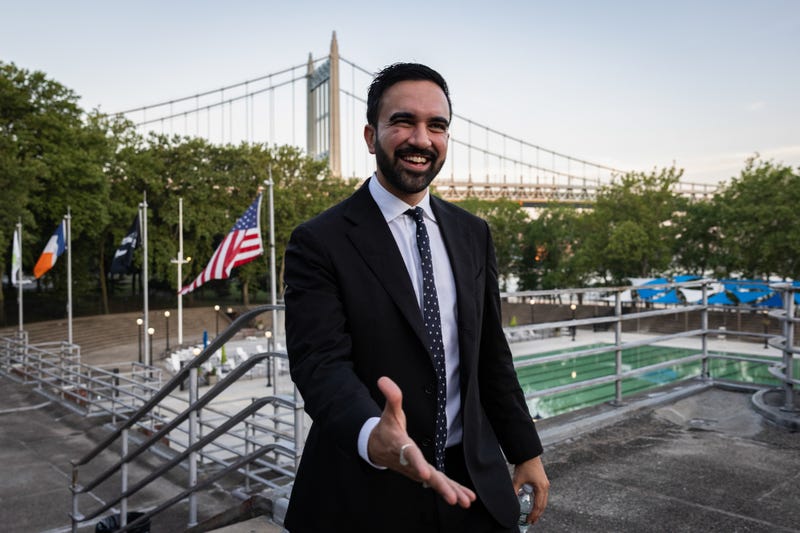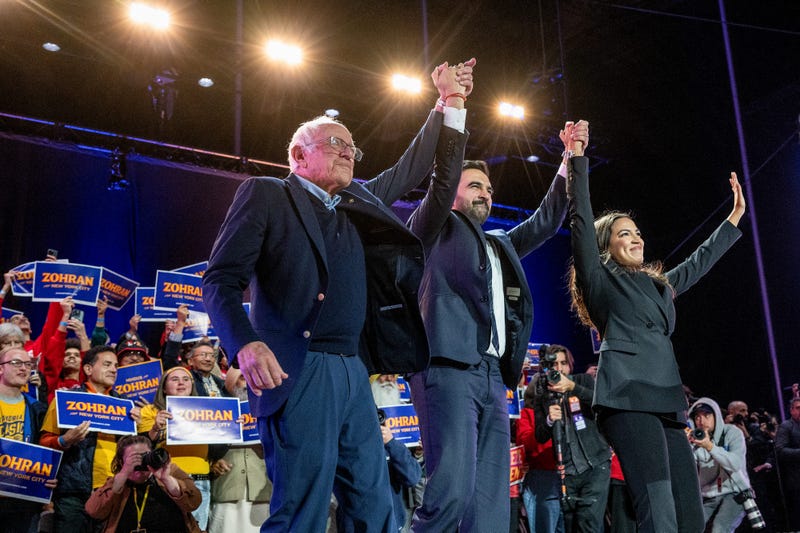
NEW YORK (BLOOMBERG) -- Zohran Mamdani’s lead heading into the New York mayoral election has withstood a furious push from Republicans, establishment Democrats and a coalition of Wall Street dealmakers, leaving Democrats to face a familiar question should he win on Tuesday.
If Mamdani can make it there, can he — or a candidate like him — make it anywhere?
Aspects of Mamdani’s campaign that some thought would doom his candidacy — his vociferous criticism of Israel’s actions in Gaza, his past calls to defund the police and his refusal to flee from the political label of socialist — haven’t turned off a plurality of New York voters, despite a torrent of campaign spending from some of the city’s wealthiest residents.
Instead, the 34-year-old assemblyman’s campaign — with its focus on core economic concerns combined with an online charm offensive and occasional searing barb at his critics — is working well enough that some political observers see a model for future Democratic candidates and races.
“His campaign is not really about him,” but hammers on the theme of lowering the cost of living for average New Yorkers, said Amanda Litman, co-founder and president of the nonprofit Run for Something, which recruits new progressive Democratic candidates. “He really clearly answers the question why voters should want him to win.”
Yet Mamdani’s ideas for how to lower the economic burden on working-class and middle-class families — including through tax hikes on the wealthy and rent freezes — have generated a current of fear among other Democratic politicians and operatives. They argue that what voters might find appealing in New York won’t carry Democrats to victories in the congressional midterms next year or the presidential election in 2028.
“Over-reading a Mamdani election, assuming he wins, could be fatal for Democrats if they think the future of winning 270 electoral votes or 51 senators runs through Brooklyn,” said Kenneth Baer, the CEO and founder of Crosscut Strategies and a longtime Democratic political adviser.

Polls have consistently shown Mamdani with a solid lead over former Governor Andrew Cuomo in a three-way matchup, which includes Republican Curtis Sliwa, the founder of the anti-crime group the Guardian Angels. A Marist poll released last week showed Mamdani taking 48% of the vote to Cuomo’s 32%. Sliwa was third at 16%.
A Quinnipiac University survey the same week showed a 10-point lead for Mamdani, as well as a generational divide: voters under age 50 support Mamdani by wide margins, while those 50 and older support Cuomo, albeit by smaller margins.
Nationally, Tuesday’s results could provide a muddled message for Democrats. While Mamdani’s progressive campaign has given him a lead in New York, the candidates leading the polls in governor’s races in New Jersey and Virginia — Representative Mikie Sherrill and former Representative Abigail Spanberger, respectively — come from the more centrist range of the Democratic spectrum.
One thing Mamdani’s critics and supporters agree on is that the assemblyman benefited from a beleaguered opposition: first in formerly-indicted Mayor Eric Adams, a once-rising Democratic star who has been plagued by scandals and dropped out of the race in September; and, second, in Cuomo, who left office in 2021 after several women accused him of sexual harassment. Cuomo denies the allegations.
“To draw the card of running against the two most disgraced figures of New York Democratic politics of the last 40 years” has only helped Mamdani, Baer said.
Some observers thought Mamdani’s repeated criticism of Israel would be a fatal weakness early in his campaign, given New York’s large Jewish population and his refusal to condemn the phrase “globalize the intifada.” But he later moderated some of that language, saying he would discourage use of the controversial phrase. He also campaigned with Jewish residents and visited a synagogue during the High Holy Days. Still, a Quinnipiac poll showed Cuomo winning the majority of registered Jewish New Yorkers, with Mamdani getting just 16%.
Mamdani’s candidacy has so far overcome opposition from a broad collection of New York’s most influential and wealthiest residents. That includes billionaires Ronald Lauder and Bill Ackman, who supported political action committees opposing Mamdani. Ackman’s spending and lengthy missives against Mamdani on social media prompted a retort from the candidate.
“He’s spending more money against me than I would even tax him,” Mamdani joked last month in an appearance on The Breakfast Club, an iHeartRadio show.
Former Mayor Michael R. Bloomberg, the founder and majority owner of Bloomberg News parent Bloomberg LP, endorsed Cuomo and has contributed to a PAC supporting his candidacy.
Many moderate Democrats are still treading carefully.
New York Governor Kathy Hochul endorsed Mamdani while publicly maintaining her disagreements with him on some policy goals — especially an increase in the income tax that would have to run through the state capital in Albany.
Hakeem Jeffries, the Democratic leader in the House of Representatives, waited to endorse him until Oct. 24, the day before early voting began in New York. Jeffries, a Brooklyn native, said he had “principled disagreements” with Mamdani but believed the stakes for New York in the election are “existential.” But in an illustration of how Mamdani’s candidacy still divides Democrats, New York Senator Chuck Schumer — the most senior Jewish politician in the US — hasn’t been won over.
One national Democrat who embraced Mamdani quickly was Vermont Senator Bernie Sanders, another political lightening rod who doesn’t eschew the “socialist” label. The two took part in an October campaign rally in Queens that included Representative Alexandria Ocasio-Cortez.
That leaves the most prominent Democrat who hasn’t publicly endorsed Mamdani: former President Barack Obama. Obama called the assemblyman after his primary victory in June and again on Nov. 1, offering to be a sounding board for Mamdani if he’s victorious, the New York Times reported.
The one certainty for Mamdani, if he wins, is that he’ll draw fire from the New Yorker in the White House: President Donald Trump.
Trump has called Mamdani a “Communist” and White House aides have warned against the dangers of his election. Cuomo has amplified those attacks, suggesting New York — which already faces billions in infrastructure cuts and freezes under Trump — would be under even greater threat if Mamdani wins.
“Mamdani can kill New York City,” Cuomo said in an interview on SiriusXM last month, citing federal control over issues such as health care and housing.
Mamdani warned New Yorkers to brace for the possible deployment of National Guard troops by Trump. But he also told Bloomberg News in September that he’d be willing to “work with the president and the administration on anything that would benefit New Yorkers.”
So far his opponents’ warnings don’t appear to be breaking through. One Democratic strategist said the party should be focusing on which components of Mamdani’s campaign are boosting him.
“The cable news crowd is missing the point,” said Yusef Robb, who has worked for three mayors of Los Angeles. “It’s not about whether Democrats in municipal races should approach foreign affairs and cultural issues like Mr. Mamdani. It’s whether they should be as clear, consistent and compassionate as he is when it comes to housing costs, grocery costs and commuting costs — and the answer is yes.”
More stories like this are available on bloomberg.com.
